
Estudios de Linguistica-Universidad de Alicante-ELUA
Scope & Guideline
Unlocking the Future of Linguistics Through Open Access
Introduction
Aims and Scopes
- Translation Studies:
The journal emphasizes translation practices and challenges, exploring terminology, localization, and the role of language in specialized fields such as the jewelry and wine industries. - Linguistic Variation and Dialectology:
Research on morphosyntactic variation, dialect differences, and sociolinguistic attitudes is prevalent, highlighting the dynamic nature of language in different communities. - Language Acquisition and Pedagogy:
A significant focus on second language acquisition and teaching methodologies, particularly for Spanish as a foreign language, incorporating cognitive and communicative approaches. - Metaphor and Pragmatics:
The journal investigates the role of metaphor in language use, humor, and discourse markers, examining how these elements influence communication in various contexts. - Corpus Linguistics:
Utilization of corpus-based methodologies to analyze language patterns, phraseology, and specialized communication, contributing to understanding linguistic structures and usage.
Trending and Emerging
- Multimodality in Communication:
The examination of multimodal texts, particularly in specialized sectors like jewelry and wine, suggests a growing interest in how different modes of communication interact and contribute to meaning. - Inclusive Language and Sociolinguistic Attitudes:
Research on linguistic attitudes towards inclusive language highlights an increasing awareness of social issues and the role of language in promoting inclusivity. - Digital Communication and Emojis:
The exploration of non-verbal elements such as emojis in digital communication reflects a trend towards understanding contemporary language use in digital contexts. - Cognitive Linguistics and Emotion:
Studies focusing on cognitive approaches to language, particularly regarding emotions and their expression, are gaining prominence, indicating a shift towards understanding the psychological aspects of linguistics. - Interactivity in Humor and Pragmatics:
The analysis of humor in interactive contexts points to an expanding interest in pragmatics and the social dimensions of language use, particularly in conversational settings.
Declining or Waning
- Historical Linguistics:
Research focusing on historical aspects of languages, including diachronic studies and etymology, has become less prominent, indicating a shift towards contemporary linguistic issues. - Legal Language and Terminology:
The exploration of legal language and its modernization, which was previously a focal point, has seen a decrease in attention, possibly due to changing priorities in linguistic research. - Bilingualism Studies:
While bilingualism remains an important topic, the specific focus on Spanish-English bilingual education and its challenges appears to be waning, with fewer studies addressing this area directly.
Similar Journals

Glossa-A Journal of General Linguistics
Fostering Dialogue Across Linguistic DisciplinesGlossa: A Journal of General Linguistics, published by the Open Library of Humanities, stands as a leading voice in the realm of linguistic research since its inception in 2016. With its Q1 category ranking in Linguistics and Language and impressive Scopus ranks encompassing the top 83rd and 81st percentiles in its respective fields, Glossa fosters a vibrant academic community committed to the rigorous exploration of language and linguistic theory. Operating under an open access model, the journal not only enhances the visibility of groundbreaking research but also ensures that valuable insights are accessible to a global audience. The journal's commitment to interdisciplinary dialogue makes it an indispensable resource for scholars, professionals, and students eager to engage with contemporary developments in linguistics. As it converges into 2024, Glossa continues to champion innovative scholarship and critical discourse that challenges conventional boundaries within the field.
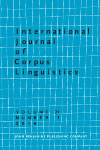
International Journal of Corpus Linguistics
Empowering Scholars to Decode LanguageThe International Journal of Corpus Linguistics, published by John Benjamins Publishing Co, is a premier academic journal dedicated to advancing the field of corpus linguistics. With an ISSN of 1384-6655 and an E-ISSN of 1569-9811, this journal serves as a pivotal platform for researchers and practitioners alike to explore the intricate relationships between language and corpora. Housed in the Netherlands and operating within the prestigious Q1 category in Linguistics and Language, the journal boasts impressive Scopus rankings, positioning it in the top percentiles of both Arts and Humanities and Social Sciences. Its commitment to rigorous peer-reviewed scholarship not only enhances understanding in the domain but also fosters collaboration among scholars. With coverage spanning from 1996 to 2024, the journal publishes cutting-edge research that contributes valuable insights into linguistic patterns and empirical studies. Whether you're an established researcher or a student embarking on your academic journey, the International Journal of Corpus Linguistics is an essential resource for anyone seeking to deepen their understanding of language through corpora.

Eurasian Journal of Applied Linguistics
Exploring Linguistic Connections and Cultural NarrativesThe Eurasian Journal of Applied Linguistics, published by Hacettepe University, ELT Department, is a distinguished open-access journal that has been contributing to the fields of linguistics and language education since 2015. With a focus on bridging cultural and linguistic understandings across Eurasia, this journal provides a platform for researchers, educators, and practitioners to share cutting-edge studies, innovative pedagogical strategies, and insightful analyses. The journal holds notable Scopus rankings within the Language and Linguistics (Rank #155/1088, 85th Percentile) and Education (Rank #696/1543, 54th Percentile) categories, evidencing its growing impact within the academic community. As it prepares to converge into a new phase from 2018 to 2024, the Eurasian Journal of Applied Linguistics aims to uphold its mission of fostering interdisciplinary dialogue and advancing knowledge in applied linguistics and its related fields.
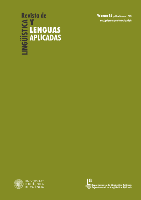
Revista de Linguistica y Lenguas Aplicadas
Fostering Dialogue in Linguistics and Language StudiesRevista de Linguistica y Lenguas Aplicadas, an esteemed journal published by UNIV POLITECNICA VALENCIA, EDITORIAL UPV, is a pivotal resource in the field of linguistics and applied languages. Since its inception, the journal has embraced Open Access publishing since 2006, ensuring that its rich repository of research is readily available to a global audience of researchers, academics, and language professionals. Headquartered in Valencia, Spain, the journal contributes significantly to the advancement of linguistics knowledge, boasting a respectable ranking within the Q3 quartile for Linguistics and Language (2023) according to Scopus metrics. It covers a diverse range of topics and methodologies, engaging readers through its commitment to scholarly rigor and innovation. The journal is uniquely positioned to inform and inspire essential discussions from 2015 to 2024, making it a vital platform for emerging linguists and seasoned scholars alike, as they explore the evolving landscapes of language and communication.

Language and Linguistics Compass
Fostering Scholarly Dialogue in Linguistic DiscoursesLanguage and Linguistics Compass, published by Wiley, stands as a premier journal in the field of linguistics, showcasing innovative and interdisciplinary research. With its ISSN 1749-818X and E-ISSN matching, the journal has built a robust reputation, achieving an impressive Q1 ranking within the linguistics category for 2023, placing it in the top 4% of its field. Its Scopus rank of 48 out of 1167 highlights its influence and significance among linguistics journals, boasting a commendable 95th percentile. This journal serves as a vital resource for researchers, professionals, and students, offering a wide range of accessible articles that illuminate current trends and advances within the domain of language studies. Although it is not Open Access, the journal is committed to quality and diversity in its publications, ensuring scholarly articles from various sub-disciplines of linguistics are represented from 2008 through 2024. Located in the United Kingdom, Language and Linguistics Compass invites contributions from around the globe, reinforcing its status as a leading forum for linguistic discourse.

Annual Review of Linguistics
Connecting Scholars Through Comprehensive ReviewsAnnual Review of Linguistics is a premier scholarly journal dedicated to advancing the field of linguistics through comprehensive and insightful reviews of current research and emerging trends. Published by ANNUAL REVIEWS, this journal is recognized for its high impact, evidenced by its Q1 ranking in the Linguistics and Language category and exceptional placements in the Scopus Ranks, positioning it in the top 2% of its field. Since its inception in 2015, the journal has served as a vital resource for researchers, professionals, and students seeking to deepen their understanding of language theories, acquisition, processing, and sociolinguistics. With no Open Access currently available, the Annual Review of Linguistics is esteemed for its rigorous peer-reviewed articles that synthesize a wealth of knowledge, making it an indispensable tool for advancing research and dialogue within the linguistic community.
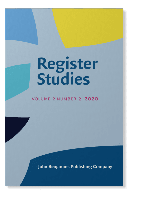
Register Studies
Fostering Interdisciplinary Insights in LinguisticsRegister Studies is an innovative and vital journal dedicated to the exploration of linguistic registers and variability in language use across diverse contexts. Published by John Benjamins Publishing Co, this journal serves as an essential resource for researchers and professionals in the fields of linguistics, sociolinguistics, and communication studies. With its emphasis on empirical research and theoretical advancements, Register Studies aims to uncover the nuances of language in social interaction, providing a platform for high-quality scholarly work. Although specific accessibility options are not outlined, the journal adheres to rigorous academic standards and strives to contribute significantly to the understanding of language's role in society. By fostering an interdisciplinary dialogue, Register Studies equips students, researchers, and educators with the insights necessary to navigate and contribute to the ever-evolving landscape of language studies.

Jezikoslovlje
Exploring the Frontiers of LinguisticsJezikoslovlje, published by the Josip Juraj Strossmayer University, Faculty of Philosophy in Croatia, is an essential publication in the field of Linguistics and Language Studies. Launched in 2008 and extending its contributions to the academic community through 2024, this journal addresses a spectrum of linguistic research, facilitating scholarly dialogue around both theoretical and applied aspects of language. With a current Scopus ranking placing it in the 54th percentile in the Arts and Humanities and the 50th percentile in Social Sciences, Jezikoslovlje serves as a vital resource for researchers and students looking to engage with contemporary linguistic issues. Although it operates under a traditional access model, its indexed presence and rigorous peer-review process ensure that published works maintain a high scholarly standard, inviting contributions that advance understanding in this dynamic discipline. The journal's commitment to fostering knowledge in linguistics makes it a significant platform for academics in Croatia and beyond.
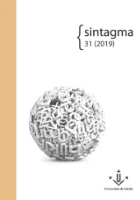
Sintagma
Bridging Research and Real-World Linguistics.Sintagma is a prominent academic journal dedicated to advancing the field of Linguistics and Language, published by the Universitat de Lleida in Spain. With an ISSN of 0214-9141 and an E-ISSN of 2013-6455, this journal has established itself as an open-access platform since 1989, thereby ensuring wide accessibility and dissemination of research. The journal's commitment to quality is reflected in its ranking within the Q4 quartile of Linguistics and Language in 2021 and a similar standing in Social Sciences and Arts and Humanities, which underscores its emerging importance in these fields despite recent challenges. Covering topics that span theoretical inquiries to applied linguistic studies, Sintagma invites researchers, professionals, and students to contribute to and engage with its evolving landscape from its unique academic perspective. With the convergence of research years from 2011 to 2018 and upcoming issues through 2024, the journal remains poised to provide insightful content that addresses the linguistic dimensions of contemporary society.
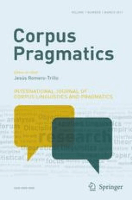
Corpus Pragmatics
Exploring the Intersection of Linguistics and Digital InnovationCorpus Pragmatics is an esteemed academic journal published by SpringerNature, focusing on the interdisciplinary field of linguistics and its applications within the realms of computer science and social sciences. With a strong foundation since its inception in 2017, the journal has made significant strides, earning recognition with a Q2 rating in Linguistics and Language and a Q3 in Computer Science Applications as of 2023. The journal's impressive Scopus rankings highlight its impact, placing it in the 86th percentile among language and linguistics journals. Corpus Pragmatics aims to bridge the gap between empirical research and theoretical insights, fostering an environment that promotes innovative approaches to understanding the complexities of language use in a digital age. As an open-access platform, it provides researchers, professionals, and students with invaluable resources to enhance their work and engage with the latest findings in the field. With a commitment to quality and relevance, Corpus Pragmatics stands out as a vital resource for advancing knowledge in linguistics and its computational applications, making significant contributions to both academia and industry.